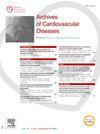高危胎儿严重先天性心脏缺陷的妊娠早期筛查:法国pracei研究
IF 2.2
3区 医学
Q2 CARDIAC & CARDIOVASCULAR SYSTEMS
引用次数: 0
摘要
先天性心脏缺陷(CHDs)是最常见的先天性异常之一,具有显著的产后死亡率。产前检测是至关重要的准备家长和医疗保健提供者的预后和管理。在法国,自2022年以来,CNEOF指南建议对包括低风险病例在内的所有妊娠进行妊娠早期心脏超声筛查。然而,有限的研究评估了这种方法在非三级医疗机构中的诊断准确性。pr本文章由计算机程序翻译,如有差异,请以英文原文为准。
First-Trimester Screening for Severe Congenital Heart Defects in High-Risk Fetuses: The French PréCaFoet Study
Introduction
Congenital heart defects (CHDs) are among the most common congenital anomalies, with significant postnatal mortality. Prenatal detection is crucial for preparing parents and healthcare providers for prognosis and management. In France, since 2022, the CNEOF guidelines recommend first-trimester cardiac ultrasound screening for all pregnancies, including low-risk cases. However, limited studies have evaluated the diagnostic accuracy of this approach in non-tertiary care settings.
Method
The PRéCaFoet study was a prospective multicenter cohort study conducted from November 2020 to May 2024 across 12 French centers. It aimed to assess the diagnostic performance of first-trimester screening for severe CHDs in high-risk pregnancies. Inclusion criteria included increased nuchal translucency (> 3.5 mm), first-degree family history of CHD, or suspicion of cardiac or extracardiac anomalies during routine first-trimester ultrasound. Diagnostic performance was evaluated using sensitivity, specificity, positive predictive value (PPV), and negative predictive value (NPV) compared to gold-standard second-trimester ultrasound or fetal autopsy.
Results
Among 401 eligible pregnancies analyzed, 375 had conclusive first-trimester reference ultrasounds (Echo Ref T1). Severe CHDs were detected in 33 fetuses at T1 and confirmed in 30 at T2. Sensitivity and specificity for severe CHD detection at T1 were 83.3% and 93%, respectively, with a PPV of 58.1% and an NPV of 98%. Sequential screening (Echo Ref T1 followed by fetal echocardiography in abdnormal or inconclusive cases) reduced non-contributive cases from 5.7% to 2.8%. Prognostic evaluation revealed significant uncertainties: among 40 severe CHD cases, cardiac type (univentricular vs. biventricular) remained undetermined in 37.5%, and curability could not be assessed in 37.5% of cases. Detection rates varied by defect type: univentricular defects (87.5%), transposition of the great arteries (100%), atrioventricular canal defects (75%), tetralogy of Fallot (50%), ventricular septal defects (25%), and total anomalous pulmonary venous return (0%).
Conclusion
First-trimester screening for severe CHDs demonstrated high sensitivity and specificity in a high-risk population within a non-tertiary care network. However, prognostic assessment at T1 proved challenging, with inconclusive classifications in over one-third of cases, underscoring limitations in early counseling for complex defects.
求助全文
通过发布文献求助,成功后即可免费获取论文全文。
去求助
来源期刊

Archives of Cardiovascular Diseases
医学-心血管系统
CiteScore
4.40
自引率
6.70%
发文量
87
审稿时长
34 days
期刊介绍:
The Journal publishes original peer-reviewed clinical and research articles, epidemiological studies, new methodological clinical approaches, review articles and editorials. Topics covered include coronary artery and valve diseases, interventional and pediatric cardiology, cardiovascular surgery, cardiomyopathy and heart failure, arrhythmias and stimulation, cardiovascular imaging, vascular medicine and hypertension, epidemiology and risk factors, and large multicenter studies. Archives of Cardiovascular Diseases also publishes abstracts of papers presented at the annual sessions of the Journées Européennes de la Société Française de Cardiologie and the guidelines edited by the French Society of Cardiology.
 求助内容:
求助内容: 应助结果提醒方式:
应助结果提醒方式:


